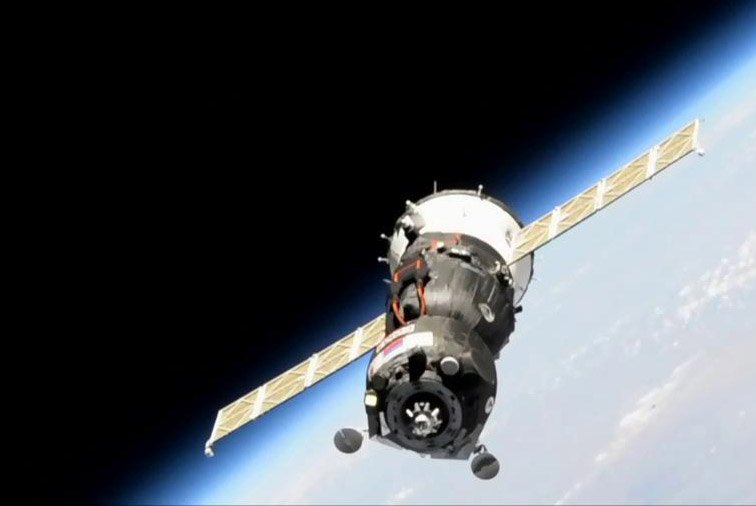The unpiloted Soyuz MS-14 spacecraft appears near the International Space Station after an aborted docking. Photo courtesy NASA TV/EPA
Aug. 24 (UPI) -- An unmanned Russian Soyuz MS-14 spacecraft aborted a docking with the International Space Station and another attempted is planned no earlier than Monday, space officials said Saturday.
The spacecraft, which was maneuvered by a robot called Skybot F-850, was aborted at 1:36 a.m. EDT, NASA said in a blog post.
After liftoff Wednesday night, the spacecraft made 34 orbits of Earth en route to its anticipated docking. Instead it came within roughly 330 feet from the ISS.
The docking could not be attempted manually because there wasn't a necessary system on board the Soyuz, a NASA announcer said during the live broadcast.
There is no threat to the International Space Station and its crew, according to Russian space agency Roscosmos in a report by state-run TASS.
The Soyuz is on safe trajectory above and behind the space station, NASA said.
Russian flight controllers have indicated the next earliest docking attempt could be Sunday night or Monday morning Russia time. NASA's mission control is 10 hours behind Kazakhstan.
Early data indicate the problem is linked to the station's side of the so-called KURS automated rendezvous system and not on the Soyuz itself.
The Russian federal space agency Roscosmos plans to send instructions to swap the signal amplifier of the station's KURS docking system and test it before another docking attempt.
The crew includes Expedition 60 commander Alexey Ovchinin and flight engineer Alexander Skvortsov.
A robot called Final Experimental Demonstration Object Research, or FEDOR, acts as an artificial cosmonaut. It was developed by Android Technology Company and the Advanced Research Fund on a technical assignment from Russia's Emergencies Ministry.
The humanoid robot will be used for experiments on the station and returned to Earth once the Soyuz MS-14 mission is complete.
Soyuz MS-14 is carrying about 1,450 pounds of supplies.
The Soyuz mission is designed to validate the spacecraft's compatibility with a revamped Soyuz booster rocket typically used to carry robotic Progress cargo ships to the space station.
The first crewed flight on the booster is projected for March 2020.
Four spaceships are parked at the space station: the SpaceX Dragon cargo craft, Russia's Progress 73 resupply ship, and Soyuz MS-12 and MS-13 crew ships.















